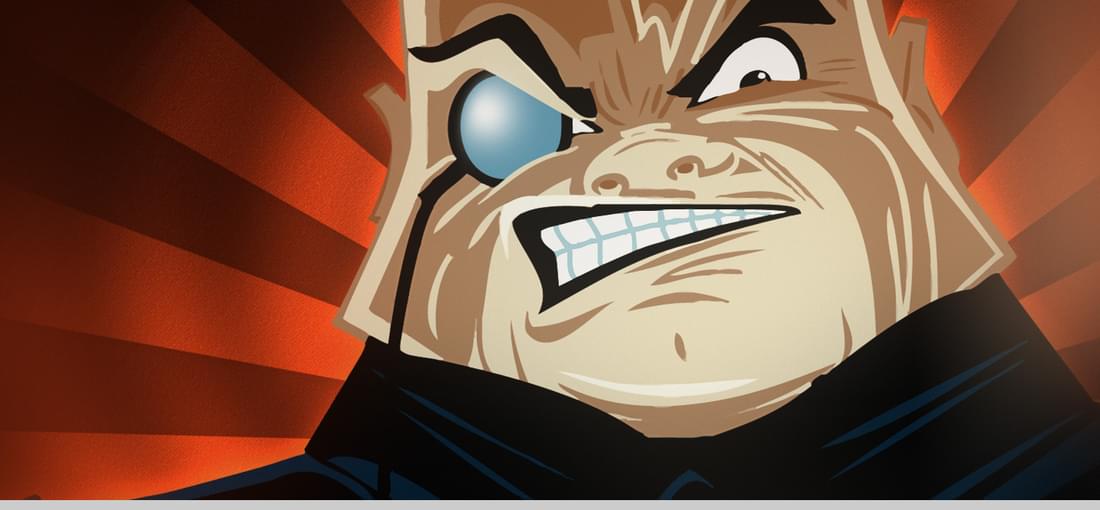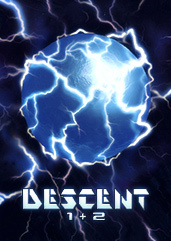


Populous is a historically significant game as it marked the beginning of the rise to prominence experienced by Bullfrog (still one of the most original and successful game companies of all time), and the advent of the god game genre. I owned the sequel to this game, Trials of the Olympian Gods on the Macintosh. I've come back at a later age to look at Populous and don't see much to come back for- everything this game does is done better by it's sequel. For those unfamiliar with the premise, Populous can be a bit strange at first. As a unnamed deity you have a small legion of followers and are tasked with wiping out a group of separate followers worshiping an AI god. Producing settlements by flattening land makes up about 50% of the game, the other half is sent sending indirect orders to your followers to attack your opponent or casting various forms of godly vengeance on them- lighting, volcanoes and the like. The game is fun but it feels a bit shallow. Levels do increase in difficulty, with harder gods, more complicated lands to settle and the like but the formula remains almost identical start to finish. There's not much in the way of visual flair here either- the cartoony graphics are cute but hardly engaging. God powers are a bit limited as well; there is some strategy here, but not much. A lot of my criticisms are probably rose tinting from the sequel Populous II which improves on all these aspects through more varied and tactical powers coupled with a stronger sense of progression and RPG elements. Even then however, the game is still pretty simple and relatively repetitive, so the modern gamer may not find it worth their while. What this game does provide us with is a marked demonstration of the boundless creativity of Bullfrog, later exemplified with Powermonger, Magic Carpet, Dungeon Keeper, Syndicate and many others. Especially when compared with a contemporary offering like From Dust or even Black and White, Populous probably won't stand up- what seems to have made it so successful was the virtue of being a well executed, unique idea. Certainly worth the time to check out.

As an Australian, it is hard to appreciate Europe as a continent, it's rich and often dark history without experience it first hand, and there is no more romantic or exciting way to do this than by train. Smoking Car productions seem to not only recognize this fact, but to accurately observe there is often more history and intrigue to witness inside the train carriages than outside. The Last Express has all the elements of a classic thriller. A faceless passenger boards a train on the eve of the Great War, immediately thrown into a murder mystery and volatile politics of Eastern Europe. Each of the richly drawn characters have a unique role in the story, and hold a piece of complex mystery. This adventure game is set apart from its contemporaries by its simulation of real-time, with each of the passengers acting on their own directives and reacting intelligently to your own actions in the game world. Above all else, this gives the sensation that this is 'your' story, you command it and influence its outcome, rather than being a scripted adventure with a few obligatory barricades in the form of puzzles. In addition to its rock-solid story and mechanics, the presentation of the game is exceptional. Although animation is sparse, the movements and expressions of the actors breathes life into story rarely even seen in modern video games. The game also includes a surprising amount of spoken dialog in various European languages- casually overhearing a grim-looking Russian discuss Marxian philosophy in one room, only to step into another and catch two young girls giggling and discussing in French the curious stranger who just walked in should give some idea just how much effort went into bringing every aspect of the Orient Express and its cast to life. I find it hard to enjoy games I didn't play in my youth from the 80's and early 90's as too often, despite rapturous reviews from nostalgic fans, they fail to be as compelling as contemporary games and are often plagued with issues long since solved. The Last Express is an exception to this rule- if you are mature enough to appreciate this game for what it is, you will be able to recognize it as an masterpiece in interactive storytelling.

I really want to like Evil Genius. It has a lot of great features- the game is loaded with style, game play mechanics are creative and interesting and the premise is both engaging and immersing. But I cannot recommend the game because none of the many great ideas the game have actually work together. AI is the main killer- not only is it unpredictable and unreliable, it's frequently buggy. There's no way of organizing units, and the operate at their own volition. While this seems like a good idea in theory it rarely works- placing kill tags on enemy agents does not direct enemies to engage in any sort of offensive, they simple file towards the enemy until he/she's dead. Seeing 5 marksmen die from melee attacks filing towards an enemy is infuriating. In the end weaken is the only safe way to take care of enemies and this is not always effective, especially if there are multiple targets. Traps are another faltering point, in the end they just don't have any use. It seems like a great idea to lace the entrance to a lair with traps, or certain parts of the base, but issues arise because minions as minions so frequently have to go outside, they are constantly passing through traps. Enemy agents can follow minions through the traps without triggering, which is bad enough, but more annoying is when they trigger traps, which usually ends up killing more of your men than of theirs. Then there are times when your minions set off traps, especially if they are damaged, which happens far more often than it should. Against strong foes traps are totally ineffectual, as most agents just destroy the sensors and the traps with guns or feet, forcing you to replace them. The world screen is also a seemingly good idea that goes terribly wrong. Raiding the world for money and researching events seems like a great idea, but heat ratings are much too unforgiving, and sending enough men away to build up a revenue tends to attract large numbers of agents- managing away teams and defense is much too fine a balance. Away teams also frequently disobey orders, coming out of hiding before agents of justice have left the region, leading to the death of hard to replace specialists without your even knowing. If things get hectic during lair management, which they often do, it's hard to keep up with the world screen, and it can be very irritating to finish dealing with one incursion to find your away teams obliterated by agents of justice. Again there are a lot of fantastic things about this game, but after more than a few hours of play it's impossible to focus on anything but the things I've mentioned in this review. Management games are hard to get right, and only a few gleam as truly functional, replayable games. Evil Genius is not one of them.

Descent marks a milestone in the FPS genre as being the first (and remains one of few) 3-dimensional games, in that all three axis can be traversed freely. The game has you traveling through the winding corridors of various mining complexes throughout the solar system, destroying rampaging mining robots. Action is very much like that of other FPS games, but the addition of the third axis allows much greater variation in environments, and the outcome of battles. Though technically a space sim, Descent should not be confused with games like Elite, the X series or even Freespace- the tactical options involved with flying are not present in this game, making it more akin to a twitch shooter than a full fledged space flight sim. The combination of the very simple shoot-em-up game play with the freedom of flight leads to a very unique gaming experience that provides a sense of freedom and exploration tied successfully with the very intense combat. The presentation and overall quality of the game is very high. Enemies are imaginative and easily recognizable in the heat of battle. Destroyed opponents will explode into pieces, that will fly across the room in a pleasing manner. Available weapons are lacking a little in variety but all feel quite visceral and are good fun to use. Again the simplicity of the game play precludes much sophistication but trying to think in three dimensions will be enough to keep you occupied without worrying too much about your armament. Descent is not without it's weaknesses. Environments reuse textures quite a bit, and many of these are unnecessarily garish and clashing. Levels tend to rely too heavily on long winding corridors too much, which doesn't really take advantage of the game play style. The long length of levels later in the game, many of which are exceedingly difficult, combined with the monotony of the level designs and textures can make gamers tire long before the experience is over, which is disappointing. Descent 2 combats the issue of getting lost with the guide bot, that automatically points you in the direction you need to go, but this removes the element of exploration and freedom the 3D game play is so well suited to. Better level design and more interaction with the environments would have solved these issues. A smaller point to make is the music. In my youth I owned the Macintosh version of Descent which had digital audio rather than the midi tunes of the PC version. The digital soundtrack is unquestionably superior, so I recommend downloading this along with the game, and playing it rather than the PC music. I can also recommend using a joystick rather than a game pad or mouse, as it gives the game that retro feel and is significantly more immerse.

Descent marks a milestone in the FPS genre as being the first (and remains one of few) 3-dimensional games, in that all three axis can be traversed freely. The game has you traveling through the winding corridors of various mining complexes throughout the solar system, destroying rampaging mining robots. Action is very much like that of other FPS games, but the addition of the third axis allows much greater variation in environments, and the outcome of battles. Though technically a space sim, Descent should not be confused with games like Elite, the X series or even Freespace- the tactical options involved with flying are not present in this game, making it more akin to a twitch shooter than a full fledged space flight sim. The combination of the very simple shoot-em-up game play with the freedom of flight leads to a very unique gaming experience that provides a sense of freedom and exploration tied successfully with the very intense combat. The presentation and overall quality of the game is very high. Enemies are imaginative and easily recognizable in the heat of battle. Destroyed opponents will explode into pieces, that will fly across the room in a pleasing manner. Available weapons are lacking a little in variety but all feel quite visceral and are good fun to use. Again the simplicity of the game play precludes much sophistication but trying to think in three dimensions will be enough to keep you occupied without worrying too much about your armament. Descent is not without it's weaknesses. Environments reuse textures quite a bit, and many of these are unnecessarily garish and clashing. Levels tend to rely too heavily on long winding corridors too much, which doesn't really take advantage of the game play style. The long length of levels later in the game, many of which are exceedingly difficult, combined with the monotony of the level designs and textures can make gamers tire long before the experience is over, which is disappointing. Descent 2 combats the issue of getting lost with the guide bot, that automatically points you in the direction you need to go, but this removes the element of exploration and freedom the 3D game play is so well suited to. Better level design and more interaction with the environments would have solved these issues. A smaller point to make is the music. In my youth I owned the Macintosh version of Descent which had digital audio rather than the midi tunes of the PC version. The digital soundtrack is unquestionably superior, so I recommend downloading this along with the game, and playing it rather than the PC music. I can also recommend using a joystick rather than a game pad or mouse, as it gives the game that retro feel and is significantly more immerse.
Descent marks a milestone in the FPS genre as being the first (and remains one of few) 3-dimensional games, in that all three axis can be traversed freely. The game has you traveling through the winding corridors of various mining complexes throughout the solar system, destroying rampaging mining robots. Action is very much like that of other FPS games, but the addition of the third axis allows much greater variation in environments, and the outcome of battles. Though technically a space sim, Descent should not be confused with games like Elite, the X series or even Freespace- the tactical options involved with flying are not present in this game, making it more akin to a twitch shooter than a full fledged space flight sim. The combination of the very simple shoot-em-up game play with the freedom of flight leads to a very unique gaming experience that provides a sense of freedom and exploration tied successfully with the very intense combat. The presentation and overall quality of the game is very high. Enemies are imaginative and easily recognizable in the heat of battle. Destroyed opponents will explode into pieces, that will fly across the room in a pleasing manner. Available weapons are lacking a little in variety but all feel quite visceral and are good fun to use. Again the simplicity of the game play precludes much sophistication but trying to think in three dimensions will be enough to keep you occupied without worrying too much about your armament. Descent is not without it's weaknesses. Environments reuse textures quite a bit, and many of these are unnecessarily garish and clashing. Levels tend to rely too heavily on long winding corridors too much, which doesn't really take advantage of the game play style. The long length of levels later in the game, many of which are exceedingly difficult, combined with the monotony of the level designs and textures can make gamers tire long before the experience is over, which is disappointing. Descent 2 combats the issue of getting lost with the guide bot, that automatically points you in the direction you need to go, but this removes the element of exploration and freedom the 3D game play is so well suited to. Better level design and more interaction with the environments would have solved these issues. A smaller point to make is the music. In my youth I owned the Macintosh version of Descent which had digital audio rather than the midi tunes of the PC version. The digital soundtrack is unquestionably superior, so I recommend downloading this along with the game, and playing it rather than the PC music. I can also recommend using a joystick rather than a game pad or mouse, as it gives the game that retro feel and is significantly more immerse.